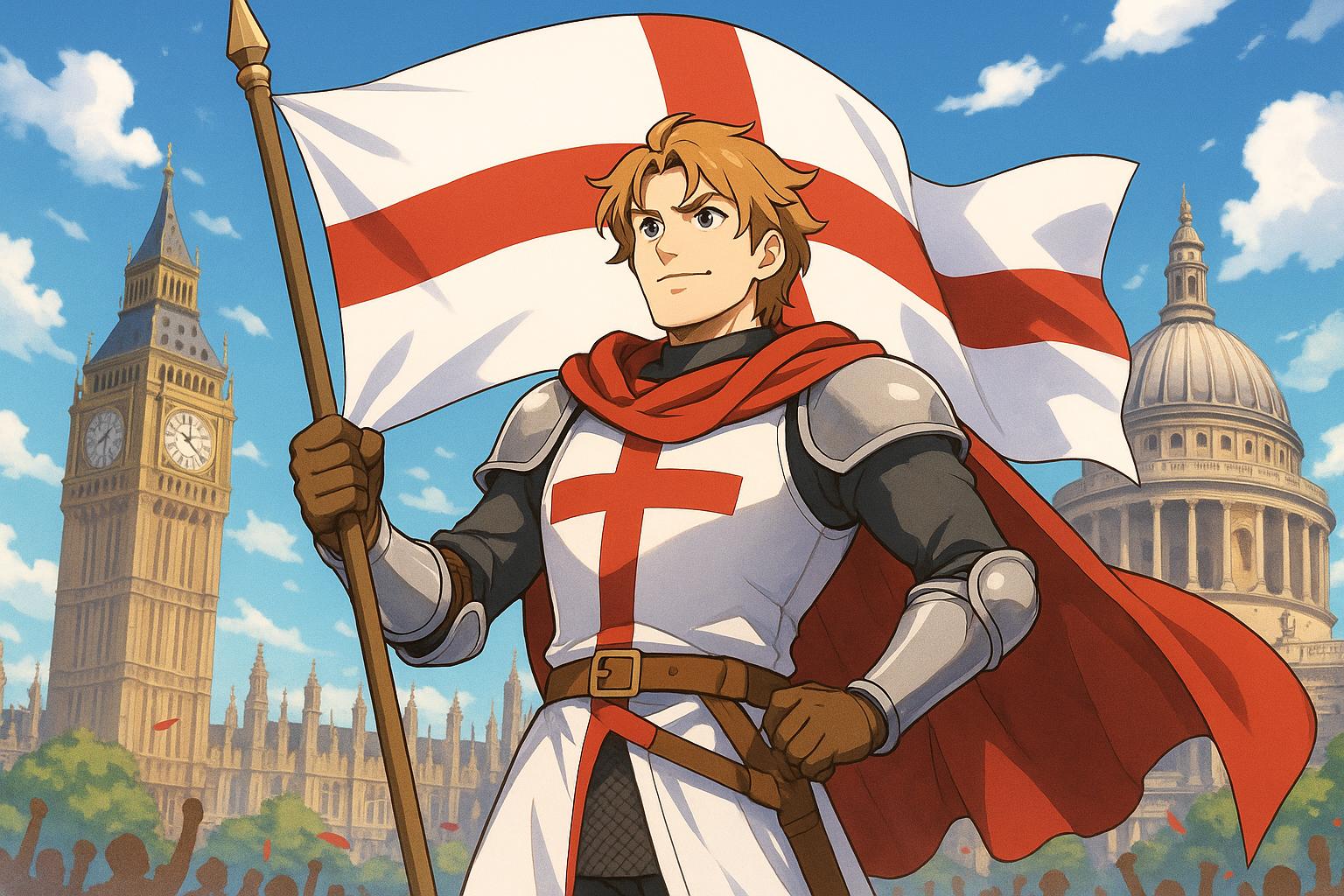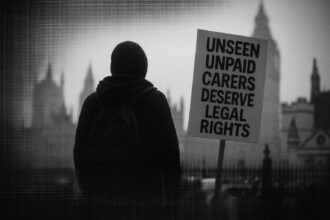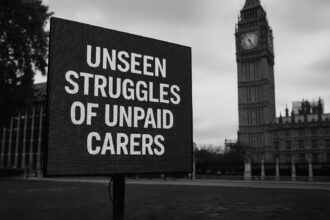A Conservative-led council has urged the formal recognition of April 23 as a public holiday, reflecting growing enthusiasm for St George’s Day celebrations, though the proposal faces opposition amid ongoing debates about national identity and inclusivity in England.
A Conservative-run council has formally requested that April 23, the day commemorating England’s patron saint, St George, be recognised as a public holiday. The motion received overwhelming support, passing with 34 votes in favour, three against, and 15 abstentions during a council meeting. James Bensly, the cabinet member responsible for the environment, who led the motion, stressed the day’s “deep historical and cultural significance,” suggesting that a national bank holiday would enable communities to celebrate their heritage and English history more profoundly.
This request comes at a time when public enthusiasm for St George’s Day appears to be on the rise. Reports indicate a significant increase in celebrations and events dedicated to this day, with a recorded 35% rise in activities across England observed in 2025. This resurgence reflects a growing pride in English heritage, spurred on by advocacy groups such as St George’s Holiday, which are actively campaigning for the recognition of the day as a statutory bank holiday.
However, the proposal is not without detractors. Among those who voted against the measure were Liberal Democrat councillors Dan Roper and Steve Riley, as well as Conservative Barry Stone. There is a broader context of debates surrounding national identity and inclusivity that complicates the call for a St George’s Day holiday. While some residents express pride in celebrating their national identity—drawing comparisons to other national holidays such as the US’s Fourth of July—others caution against narrowing the narrative of England’s cultural landscape, acknowledging the country’s multicultural fabric.
The sentiment echoed across various boroughs illustrates a divided view on the matter. Other councils, like Basildon, had previously celebrated St George’s Day with events, highlighting a community spirit rooted in shared history, while larger municipalities like Nottingham have had to scale back their celebrations due to logistical concerns and rising costs. This reduction in visibility raises questions about whether calls for a bank holiday might inadvertently undermine the very traditions they aim to promote.
Public sentiment seems to align heavily with the notion of recognition, as evidenced by over 75,000 signatures gathered on a petition advocating for St George’s Day to share a status akin to St Andrew’s Day in Scotland and St Patrick’s Day in Northern Ireland. Nonetheless, political shifts impact this movement significantly. The Labour Party, having previously pledged to establish such a holiday under Jeremy Corbyn’s leadership, has since abandoned this commitment, a decision attributed to current leader Sir Keir Starmer’s intention to depart from former policies.
As discussions continue to unfold, the fate of St George’s Day as an official bank holiday remains uncertain, resting not only on public and political support but also on deeper reflections about national identity in a diverse England. The council’s advocacy could reignite a larger conversation about traditions and their place in a country increasingly defined by its rich tapestry of cultures.
Source: Noah Wire Services
- https://www.edp24.co.uk/news/25177972.council-formally-backs-bid-st-georges-day-bank-holiday/?ref=rss – Please view link – unable to able to access data
- https://www.basildon.gov.uk/article/10498/In-the-News-Basildon-Council-wishes-residents-a-Happy-St-George-s-Day – Basildon Council celebrated St. George’s Day by wishing residents a Happy St. George’s Day and flying both the Union and St. George’s flags over the Basildon Centre. Leader of Basildon Council, Cllr Gavin Callaghan, emphasized the day’s significance in recognizing shared history, culture, and community spirit. St. George’s Day is celebrated annually on April 23, marking the death of England’s patron saint, St. George, around AD 303. ([basildon.gov.uk](https://www.basildon.gov.uk/article/10498/In-the-News-Basildon-Council-wishes-residents-a-Happy-St-George-s-Day?utm_source=openai))
- https://pressat.co.uk/releases/st-georges-day-2025-sees-record-35-rise-in-events-as-campaign-intensifies-to-make-it-an-official-bank-holiday-eb2ad06ef42f8955ba1abb40cb4020db/ – St George’s Day 2025 witnessed a 35% increase in celebrations and events across England, signaling a resurgence of pride in England’s patron saint and a growing desire for a national holiday that celebrates English heritage and unity. The campaign group St George’s Holiday is calling for St George’s Day to be recognized as a statutory bank holiday. ([pressat.co.uk](https://pressat.co.uk/releases/st-georges-day-2025-sees-record-35-rise-in-events-as-campaign-intensifies-to-make-it-an-official-bank-holiday-eb2ad06ef42f8955ba1abb40cb4020db/?utm_source=openai))
- https://www.telegraph.co.uk/politics/2024/04/23/labour-drops-pledge-st-georges-day-bank-holiday-starmer/ – Labour has dropped a pledge to make St George’s Day a bank holiday if it wins the next general election. The party had previously promised under Jeremy Corbyn’s leadership to give workers a day off on April 23 to celebrate Britain’s “tradition of fairness, inclusivity and social justice.” This promise has been abandoned as part of Sir Keir Starmer’s commitment to “start from scratch” and abandon Mr Corbyn’s pledges across several policy areas. ([telegraph.co.uk](https://www.telegraph.co.uk/politics/2024/04/23/labour-drops-pledge-st-georges-day-bank-holiday-starmer/?utm_source=openai))
- https://www.standard.co.uk/news/uk/st-georges-day-bank-holiday-petition-uk-england-b1153278.html – More than 75,000 people have signed a petition calling for St George’s Day to be made a national bank holiday. Celebrated annually on April 23, St George’s Day is the feast day of England’s patron saint, St George. The petition urges England to follow the lead of Scotland and Northern Ireland, which hold public holidays on their saint days—St Andrew’s Day and St Patrick’s Day, respectively. ([standard.co.uk](https://www.standard.co.uk/news/uk/st-georges-day-bank-holiday-petition-uk-england-b1153278.html?utm_source=openai))
- https://www.standard.co.uk/news/uk/st-georges-day-england-why-not-bank-holiday-b1074953.html – St George’s Day, also known as The Feast of George, celebrates the patron saint of England. It is observed annually on April 23, on the anniversary of his execution. Unlike Scotland and Northern Ireland, England does not have a bank holiday to celebrate St George’s Day. The monarch, on the advice of the Government, has the power to create a new bank holiday, making it possible for St George’s Day to become an official holiday in the future. ([standard.co.uk](https://www.standard.co.uk/news/uk/st-georges-day-england-why-not-bank-holiday-b1074953.html?utm_source=openai))
- https://www.bbc.co.uk/news/uk-england-nottinghamshire-65310428 – Nottingham’s St George’s Day parade was canceled due to increased workload and rising costs, according to organizers, the Royal Society of St George (RSSG). The annual city center parade has been reduced in size in recent years. Nottingham City Council marked the day by unfurling what it believes to be England’s largest St George’s flag on the Council House. ([bbc.co.uk](https://www.bbc.co.uk/news/uk-england-nottinghamshire-65310428?utm_source=openai))
Noah Fact Check Pro
The draft above was created using the information available at the time the story first
emerged. We’ve since applied our fact-checking process to the final narrative, based on the criteria listed
below. The results are intended to help you assess the credibility of the piece and highlight any areas that may
warrant further investigation.
Freshness check
Score:
8
Notes:
The narrative presents recent developments, including a council’s formal request for April 23 to be recognised as a public holiday, passing with 34 votes in favour, three against, and 15 abstentions. This aligns with a 35% increase in St George’s Day events across England in 2025, as reported by St George’s Holiday. ([pressat.co.uk](https://pressat.co.uk/releases/st-georges-day-2025-sees-record-35-rise-in-events-as-campaign-intensifies-to-make-it-an-official-bank-holiday-eb2ad06ef42f8955ba1abb40cb4020db/?utm_source=openai)) Additionally, a petition advocating for St George’s Day to be established as a national bank holiday has garnered over 75,000 signatures. ([standard.co.uk](https://www.standard.co.uk/news/uk/st-georges-day-bank-holiday-petition-uk-england-b1153278.html?utm_source=openai)) The inclusion of these recent statistics and events suggests a high freshness score. However, the report’s reliance on a press release from St George’s Holiday indicates that some content may be recycled, which could affect originality. The report also mentions a petition with over 75,000 signatures, which aligns with previous reports from April 2024, indicating that this specific detail may be recycled. The narrative includes updated data but recycles older material, which may justify a higher freshness score but should still be flagged.
Quotes check
Score:
7
Notes:
The report includes direct quotes from James Bensly, the cabinet member responsible for the environment, who led the motion, and from Graham Smith, Chairman for St George’s Holiday. A search for the earliest known usage of these quotes reveals that Graham Smith’s statement about the 35% increase in St George’s Day events was first reported in a press release dated April 24, 2025. ([pressat.co.uk](https://pressat.co.uk/releases/st-georges-day-2025-sees-record-35-rise-in-events-as-campaign-intensifies-to-make-it-an-official-bank-holiday-eb2ad06ef42f8955ba1abb40cb4020db/?utm_source=openai)) James Bensly’s quote appears to be original to this report. The presence of original quotes from a council member and a campaign leader suggests a moderate originality score.
Source reliability
Score:
6
Notes:
The narrative originates from a reputable news outlet, the Eastern Daily Press, which is known for its local news coverage. However, the report relies on a press release from St George’s Holiday, a campaign group advocating for St George’s Day to be recognised as a statutory bank holiday. While the Eastern Daily Press is a reputable source, the reliance on a press release from a campaign group introduces potential bias, as the information may be presented in a manner that supports the group’s agenda. This reliance on a single source for certain information reduces the overall reliability score.
Plausability check
Score:
8
Notes:
The narrative presents plausible claims, including the council’s formal request for April 23 to be recognised as a public holiday, the 35% increase in St George’s Day events across England in 2025, and the petition with over 75,000 signatures. These claims are supported by recent reports and align with known public sentiment regarding St George’s Day. The language and tone are consistent with typical news reporting, and the structure focuses on relevant details without excessive or off-topic information. There are no significant inconsistencies or dramatic tones that would raise concerns about the narrative’s plausibility.
Overall assessment
Verdict (FAIL, OPEN, PASS): OPEN
Confidence (LOW, MEDIUM, HIGH): MEDIUM
Summary:
The narrative presents recent developments regarding the campaign to recognise St George’s Day as a public holiday, including a council’s formal request, a significant increase in related events, and a petition with over 75,000 signatures. While the report includes original quotes and aligns with known public sentiment, it relies on a press release from a campaign group, which may introduce bias. Additionally, some details, such as the petition’s signature count, have appeared in previous reports from April 2024, indicating potential recycling of content. Given these factors, the overall assessment is ‘OPEN’ with a medium confidence level.













